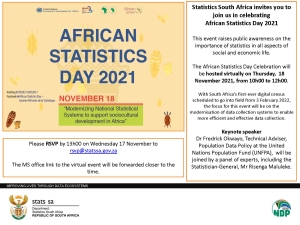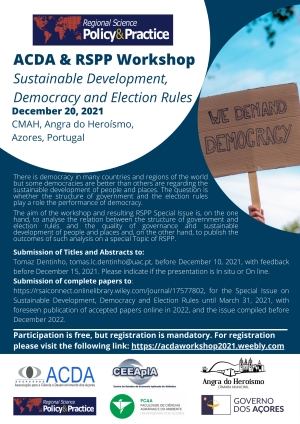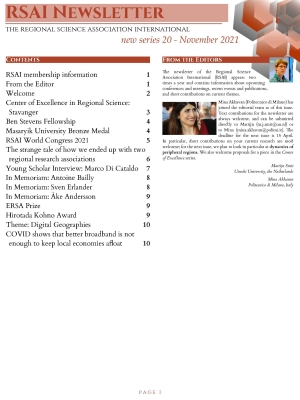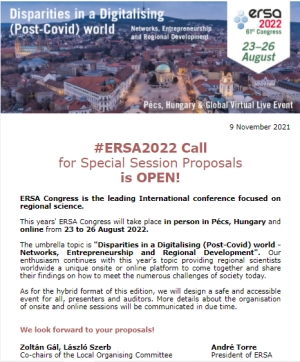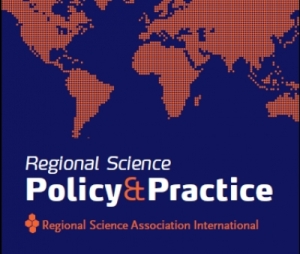Council
Elisabete Martins
INVITATION TO VIRTUAL EVENT: AFRICAN STATISTICS DAY-18November 2021- LINK ACCESS & PROGRAM
Statistics South Africa invites you to join us in celebrating
African Statistics Day 2021
This event raises public awareness on the importance of statistics in all aspects of social and economic life
The event will be hosted virtually on Thursday, 18 November 2021 from 10h00 - 12h00
Venue: Microsoft Teams virtual event
PLEASE CLICK ON BELOW MENTIONED LINK TO GAIN ACCESS TO EVENT
With South Africa’s first ever digital census scheduled to go into field from 3 February 2022,
the focus for this event will be on the modernization of data collection systems to enable
more efficient and effective data collection.
Theme: "Modernizing National Statistical Systems to support sociocultural development in Africa"
Keynote speaker:
Dr Fredrick Okwayo - Technical Advisor , Population Data Policy at
United Nations Population Fund (UNFPA)
Please RSVP by 13h00 on Wednesday, 17 November 2021
to This email address is being protected from spambots. You need JavaScript enabled to view it.
ACDA & RSPP Workshop on Sustainable Development, Democracy and Election Rules, December 20, 2021
The aim of the workshop and resulting RSPP Special Issue is, on the one hand, to analyse the relation between the structure of government and election rules and the quality of governance and sustainable development of people and places and , on the other hand, to publish the outcomes of such analysis on a special Topic of RSPP.
Associate Director of the School of Landscape Architecture & Planning and Chair of the Department of Urban & Regional Planning in the UF College of Design, Construction and Planning
Associate Director of the School of Landscape Architecture & Planning and Chair of the Department of Urban & Regional Planning in the UF College of Design, Construction and Planning
Job Description
The University of Florida’s Department of Urban & Regional Planning (URP) seeks a visionary leader and proven educator who is committed to advancing issues of equity, diversity and inclusion to serve as Associate Director of the School of Landscape Architecture and Planning and as Chair of the Department of Urban & Regional Planning.
Our mission is to prepare future practitioners and scholars committed to advancing the efficacy, impact, and knowledge of the discipline of urban and regional planning, to engage in research and scholarship that enhances the understanding and practice of the profession, while addressing societal challenges and serving to the communities of our state, nation and the globe.
We seek applications from candidates who align with our mission, are passionate about working with faculty and students, are committed to research and creative scholarship, are respected researchers and educators, and who operate with the highest levels of ethical standards and integrity.
The position is a twelve-month appointment and is available from July 1st, 2022.
The Department and School
The University of Florida (UF) is a top-tier public, comprehensive, land-grant research institution, currently ranked 5th among all U.S. public universities by U.S. News and World Report. UF is dedicated to achieving and maintaining a culture of educational and research preeminence and the Department of URP within School of Landscape Architecture and Planning shares this drive while continuing to build on a strong tradition of research and teaching excellence, external engagement, and student achievement.
The Department of Urban & Regional Planning benefits from a collaborative environment with the Department of Landscape Architecture (LAE), also housed in the School of Landscape Architecture and Planning. The School builds on the synergies of the two disciplines and enjoys fostering rich opportunities for collaboration with scholars and experts in sustainability, environment and design, systems thinking, policy making, and regionalism. The School, created in 2009, benefits from a unique association with other allied design disciplines in the College including Architecture, Construction Management, Historic Preservation, Interior Design, and Sustainability. The Department’s mission is further supported by interdisciplinary research pursued by integrative research institutes, including the College’s Florida Institute for Built Environment Resilience (FIBER), the Florida Water Institute, and Florida Climate Institute, as well as multiple other Centers within the School and College.
This is a pivotal and exciting moment for the profession and the Department of URP. The Department of URP consists of a collegial faculty of twelve core, full-time members, as well as faculty affiliated with College research centers and programs. The Department, founded in 1975, was first accredited in 1978 and offers a master’s degree in URP (we are the first and only in the country to include accredited degrees being delivered both fully-online and via a traditional campus-based program), a large STEM designated Ph.D. program, a graduate minor, an undergraduate minor, a combined undergraduate-master’s degree (4+1), a graduate certificate in Urban Analytics and is in the final approval stage of a new Master of Science in Urban Analytics. Our growing and vibrant faculty are nationally and internationally recognized and are among the most productive in the country consistently attracting significant amounts of research funding every year.
The Associate Director and Chair will be responsible for contributing to the impact, focus and reputation of the Department of URP. As Associate Director and Chair, the position will directly report to the Dean of the College of Design, Construction and Planning, and works closely with the department chairs, faculty and key stakeholders in or affiliated with the Department of URP. As Associate Director, this position will work with the Director of School to create a cohesive vision for the School. It requires a certain type of leadership; someone who is able to lead dynamic new initiatives while developing current strengths within the respective programs; and identify and support focused research engagement and creative scholarship; and is able to cultivate student learning and foster alumni relations while promoting impactful outreach on the campus and in local, state, national and international contexts.
Importantly, the Associate Director and Chair position places a premium on innovation supported through a collegial environment. Openness to diverse ideas as well as openness in decision-making are essential skills for this position. Other leadership qualities include a vision to identify and develop a cutting-edge agenda in research, creative scholarship, teaching and service. Importantly, the Associate Director and Chair should be able to cultivate shared synergies between landscape architecture and urban & regional planning. He/she also needs to contribute to college- wide planning, fundraising, and engagement at the university level.
Finally, the Associate Director and Chair will also need strong interpersonal skills as an advocate for the Department’s stakeholders, including the professional community and program alumni. Further, it is critical to uphold an academic culture in the Department and School that demonstrates a commitment to diversity and equal opportunities across race, ethnicity and gender. In sum, the Chair sets the vision for the Department and establishes new opportunities while building on existing strengths for the Department and School through shared governance with stakeholders. In addition to administrative responsibilities, the Associate Director and Chair will also be asked to lead by example, create and support a research culture within the Department and School, and is expected to assist with meeting the departmental teaching needs (albeit at a reduced load).
This search is following an aggressive timeline. Applicants are encouraged to apply as soon as possible.
Applications will be reviewed beginning November 29th
Job Qualifications Required:
- Ph.D. in urban and regional planning or related field, such as urban studies, city planning, spatial planning, urban geography, etc.
- Distinguished record in teaching, funded research, creative scholarship, and service, sufficient to merit tenure upon hire at the rank of Professor.
- Academic administrative experience including management of budgets, personnel, and curriculum development at undergraduate or graduate levels
- Excellent communication skills
- Understanding of the importance of fundraising and alumni relations
- A demonstrated record of:
- Advancing the knowledge of urban and regional planning and its evolving role in society and effectively communicating its value within government, industry, and academic sectors
- Experience with extramural funding for research or funding that supports creative scholarship
- Commitment to undergraduate and graduate education, including online education, engagement with students, and promotion of student success
- Commitment to faculty development and mentoring
- Commitment to advancing issues of equity, diversity, and inclusion
Desired:
- Certification with the American Institute of Certified Planners
- Experience with professional program accreditation at undergraduate and graduate levels
- Experience with online education
- Experience establishing and implementing a strategic plan with clear goals and outcomes
- Experience working with intercollegiate, interdisciplinary, and international partnerships and programs
- Commitment to collaboration across college disciplines, institutes, and centers
- Experience with attracting, developing, and retaining outstanding faculty and staff
- Experience in fundraising and working with donors
- Experience with marketing and communications
- Experience working with advisory boards and maintaining relationships with alumni and industry professionals
- Experience in leading and/or actively participating in the field’s professional and academic organizations
INSTRUCTIONS
Applications will be accepted until the position is filled. Interested applicants are required to apply at https://jobs.ufl.edu. To ensure full consideration, the required documents should be submitted by November 29, 2021 when the Search Committee will begin reviewing applications and will continue until the positions are filled. A completed application should include a CV, letter of interest and vision for the department/school, research agenda/portfolio, and names and contact information for a minimum of three references (the references will not be contacted prior to receiving permission from applicants). For additional information, contact Robert Cox, Ph.D., Search Committee Chair (This email address is being protected from spambots. You need JavaScript enabled to view it.).
Final candidate will be required to provide official transcript to the hiring department upon hire. A transcript will not be considered “official” if a designation of “Issued to Student” is visible. Degrees earned from an education institution outside of the United States are required to be evaluated by a professional credentialing service provider approved by National Association of Credential Evaluation Services (NACES), which can be found at http://www.naces.org/.
The University of Florida is an equal opportunity institution dedicated to building a broadly diverse and inclusive faculty and staff.
The University of Florida is An Equal Employment Opportunity Institution. If an accommodation due to a disability is needed to apply for this position, please call 352/392-2477 or the Florida Relay System at 800/955-8771 (TDD). Hiring is contingent upon eligibility to work in the US. Searches are conducted in accordance with Florida's Sunshine Law.
Two tenure track Assistant Professor at The Department of Applied Economics at Oregon State University
The Department of Applied Economics at Oregon State University is seeking to fill two tenure-track faculty positions at the rank of Assistant Professor with a start date of September 2022. The focus areas for the faculty positions are: agricultural production including agricultural and food business management; and regional/community economic development. Both positions afford the opportunity to integrate an extension/outreach emphasis with applied research and teaching and build working relationships with other faculty across campus and across the state. The positions are addressing a broad range of issues relevant to Oregon’s urban and rural communities and innovative agricultural and food industries and are supported from the Oregon cooperative extension service, the College of Agricultural Sciences experiment station research, and university teaching resources.
Assistant Professor (tenure-track), Applied Economics. Focus area: agricultural economics and agricultural and food economics and business management. The Department of Applied Economics at Oregon State University seeks to hire a faculty member at the rank of Assistant Professor, tenure-track, to engage in extension, outreach and applied scholarship, and teaching with a strong emphasis on food and agribusiness economics and management and/or agricultural production. Position posting: https://jobs.oregonstate.edu/postings/110147.
Assistant Professor (tenure-track) Applied Economics. Focus area: Regional and Community Economic Development. The Department of Applied Economics at Oregon State University seeks to hire a faculty member at the rank of Assistant Professor, tenure-track, to engage in extension/outreach, research and teaching in the area of regional and community economic development including applied policy analysis .This is a faculty position with significant responsibility in developing an integrated extension and research program to address sustainable development using economic foundations, quantitative methods and data-informed analytics. Position posting: https://jobs.oregonstate.edu/postings/110134.
Priority consideration: search committee will review applicants starting December 15, 2021. Full consideration: submit application materials by January 15, 2022. Please email search committee chair Susan Capalbo at This email address is being protected from spambots. You need JavaScript enabled to view it. with position-related questions.
Oregon State University's 2019-23 strategic plan (SP4.0): Transformation, Excellence and Impact articulates the university’s distinctive focus on academic excellence in all aspects of learning, discovery and engagement. Faculty are committed to innovation and collaboration with other faculty and students within their department and across the university. Outputs and impacts from faculty efforts to promote diversity, equity, and inclusion are included in promotion and tenure dossiers. OSU is also committed to addressing the needs of faculty, including dual career and spousal accommodations. For further information about our commitments to well-being and healthy work-life opportunities please visit our resource page
The College of Agricultural Sciences is committed to enhancing student success by engaging students in quality academic, research, internships, global studies, and other experiential learning opportunities. Positions with primary responsibility for extension and outreach are likewise committed to learner success through programming appropriate for diverse audience.
RSAI Newsletter (November 2021)
Dear RSAI members,
I hope this email finds you well.
I am pleased to write you to send you the newest issue of the RSAI Newsletter (download). This marks another step forward for our association. On the one hand, it lands on your desks while the first in-presence meeting of the North American Regional Science Council in two years is taking place in Denver, Colorado. Moreover, it is also the first issue of the newsletter co-edited by Mina Akhavan, whom the RSAI Council chose to join Martijn Smit in drafting this important vehicle of information for our members. Welcome Mina!
Enjoy the read, and please do not hesitate to get in touch with Martijn (This email address is being protected from spambots. You need JavaScript enabled to view it.) and Mina (This email address is being protected from spambots. You need JavaScript enabled to view it.) to propose new material for the newsletter.
Kind regards,
Winner of 2021 RSAI Dissertation Award
 Andreas Diemer is chosen as the winner of the RSAI dissertation award in 2021 for his work "Essays in the Spatial Economic Analysis of Social Interactions."
Andreas Diemer is chosen as the winner of the RSAI dissertation award in 2021 for his work "Essays in the Spatial Economic Analysis of Social Interactions."
The dissertation develops an interdisciplinary approach to identify the role of social networks in determining economic outcomes of both people and places, and discusses how social and geographical spaces interact to shape the fortunes of individuals and regions, using big data.
The committee found his dissertation to be novel and creative in the research framework, analysis and implications.
He received his Doctorate from London School of Economics, and was supervised by Professor Simona Iammarino and Prof. Michael Storper. Dr. Diemer is now at Swedish Institute for Social Research.
Congratulations!
Job Position | Assistant /Associate Professor: Environmental Economics, University of Illinois Urbana-Champaign, Department of Agricultural and Consumer Economics
Assistant /Associate Professor: Environmental Economics
University of Illinois Urbana-Champaign
Department of Agricultural and Consumer Economics
WE TRANSFORM LIVES. Everything we do is designed to improve the quality of life of the people in the state of Illinois, across the nation, and around the world. We discover, develop, translate, and disseminate knowledge to address societal concerns and train the next generation of experts and leaders in a way that empowers them to expand the boundaries of science to higher levels of understanding and influence.
Be a part of our story. The Department of Agricultural and Consumer Economics (ACE) is comprised of world-renowned faculty whose research and outreach programs influence national and international policymaking on issues ranging from how producers, consumers, and agribusinesses manage risk and adapt to climate change to the impacts of new technologies, environmental regulations, federal laws on profitability and human well-being.
The University of Illinois is an Equal Opportunity, Affirmative Action employer that recruits and hires qualified candidates without regard to race, color, religion, sex, sexual orientation, gender identity, age, national origin, disability or veteran status. For more information, visit http://go.illinois.edu/EEO.
The Department of Agricultural and Consumer Economics (ACE) seeks to fill a tenure-track position in Environmental Economics with a focus on the economics of climate change. The selected candidate will have a research program employing advanced quantitative methods to investigate issues related to climate change impacts, mitigation, and/or adaptation. The position will fill critical needs in graduate teaching and advising in environmental economics, in addition to teaching a course at the undergraduate level.
Responsibilities: The person filling this position will be expected to: (1) develop or maintain (depending on rank) a nationally-prominent research program with publications in leading peer-reviewed scientific journals, (2) contribute to the Department’s undergraduate and graduate teaching programs through teaching (generally two courses per year) and student advising, and (3) communicate research results to relevant policy makers and stakeholders.
ACE and the University of Illinois provide a rich collaborative research environment in climate change studies with the presence of research centers such as the Institute for Sustainability, Energy and Environment (ISEE), the Center for Climate, Regional, Environmental and Trade Economics (CREATE), the Center for the Economics of Sustainability (CEOS), the Center for Digital Agriculture (CDA), collaboration with departments such as Crop Sciences, Atmospheric Sciences, Natural Resources & Environmental Sciences, Civil and Environmental Engineering, and access to world-class computational resources through the National Center for Supercomputing Applications (NCSA).
Qualifications: All candidates must have a Ph.D. in agricultural/applied economics, economics or related field. Candidates at the Assistant Professor level should show potential for strong research and teaching programs in their area of specialization, and must have completed their degree before the start date of the appointment. Candidates at the Associate Professor level must have a record that shows real promise of becoming a leader in research, teaching, and service, with a high demonstrated likelihood of sustaining contributions to the field and to the department.
Salary and Appointment: Competitive, based on qualifications and rank, 9-month academic year, tenure track, 55% research / 45% teaching.
Start Date: The anticipated starting date for the position is August 16, 2022.
Application: To ensure full consideration, applications must be received by December 10, 2021, but applications will be accepted until a candidate for hire has been identified. Interviews may begin before the closing date; however, no offers will be extended until after the date. To apply, please create a candidate profile at http://jobs.illinois.edu and upload a brief cover letter, a CV, a sample of written work, a research statement, a teaching statement, a statement describing the candidate’s commitment to promoting diversity, equity and inclusion, and names/contact information for three references.
Additional Information: For additional information about the department, see https://ace.illinois.edu/. For additional information about the position, contact the search chair, Sandy Dall’erba at This email address is being protected from spambots. You need JavaScript enabled to view it..
University of Illinois faculty, staff and students are required to be fully vaccinated against COVID-19. If you are not able to receive the vaccine for medical or religious reasons, you may seek approval for an exemption in accordance with applicable University processes.
The University of Illinois conducts criminal background checks on all job candidates upon acceptance of a contingent offer. Convictions are not a bar to employment. The University of Illinois System requires candidates selected for hire to disclose any documented finding of sexual misconduct or sexual harassment and to authorize inquiries to current and former employers regarding findings of sexual misconduct or sexual harassment. For more information, visit Policy on Consideration of Sexual Misconduct in Prior Employment. As a qualifying federal contractor, the University of Illinois System uses E-Verify to verify employment eligibility.
Illinois welcomes individuals with diverse backgrounds, experiences, and ideas who embrace and value diversity and inclusivity. (https://diversity.illinois.edu/). Diversity, equity, inclusion, and belonging are core values at UIUC. Our excellence can only be fully realized by faculty, students, and academic and nonacademic staff who share our commitment to these values. Successful candidates for our academic positions will demonstrate evidence of a commitment to advancing diversity, equity and inclusion.
Apply for Position: https://jobs.illinois.edu/faculty-positions/job-details?jobID=155930&job=agricultural-consumer-economics-assistant-associate-professor-environmental-economics-155930
#ERSA2022 Call for Special Session Proposals is OPEN LINK
|
|
|
|
|
|
|
|
|
Call for papers | RSPP Special Session on Sustainable Development of Afghanistan at the 52nd conference of RSAIndia
52nd Regional Science Conference
on
Resurgence of Regions
To be held at
The Institute of Development Studies Kolkata (IDSK), Kolkata, West Bengal, India
Call for papers for the
RSPP Special Session on
Sustainable Development of Afghanistan
by
Abdul Shaban
Tata Institute of Social Sciences, Mumbai and
Rohina Zaffari
University of Kabul, Kabul
Human capital, democracy, peace, economic openness, and physical resources play determining role in the development of any country or region. Afghanistan, a country with about 39 million population, is endowed with enormous natural resources. The country is located on the crucial crossroad of China, India, Central Asia, and the Middle East. Notwithstanding its geopolitical significance and the rich mineral resources, the political and social instabilities have acted as barriers to the economic development of the country. The war over the years and conservative social practices have kept Afghanistan economically deprived. It is not surprising that today’s Afghanistan is one of the least developed countries of the world. Scarce data reveal that about 38% of the population of the country lived below the poverty line in 2010, and per capita income was only US $461 in 2020. Because of war and poverty, the net migration in 2020 was -315 thousand.
Given, the difficult political history and development situation, Afghanistan requires deeper analysis of its existing situation and human practices to learn and track itself on the path of sustainable development. The major challenge before the country is how to evolve a war-torn economy into a peaceful, prosperous, and sustainable economy?
This proposed special session will attempt to understand the possibilities of development of Afghanistan in the context the regional history and current realities, with the following major subareas (though not limited to),
- From war to peace, prospects for regional development in Afghanistan
- Regional philosophy of peace and development and spatial practices
- Economic structure and potentials of growth
- Inequality, poverty, and potential for sustainable community development
- The role of trade, especially the regional trade (India, Pakistan, China, Iran, and Central Asian Countries), and investment in development,
- Urban centres, regional growth (including rural-urban), and development
- Educational Institutions, skills, and human capital
- Women and development
- Sustainable Development Goals in the Regions of Afghanistan
Submission of abstract for the special session
For the special session, we invite an abstract of 250-500 words from prospective authors highlighting the research problem, data, methods, major findings, and policy suggestions. The last date of submission of the abstract is 25 November 2021. Author(s) of papers will be communicated about the suitability of their abstracts, with suggestions if any by 23th November 2021. This Special Session will be held online on 10th December 2021
The authors presenting paper in this special session will have an opportunity to submit their paper for special issue of the Journal Regional Science Policy & Practice. For details see,
https://regionalscience.org/index.php/news/journals/item/2872-rspp-call-for-papers- special-issue-on-sustainable-development-of-afghanistan.html
The abstract can be emailed to This email address is being protected from spambots. You need JavaScript enabled to view it. with copy (cc) to This email address is being protected from spambots. You need JavaScript enabled to view it.
Please mark in Subject Line “Abstract for RSPP Special Session”
The authors of the abstracts will be requested to register for the conference once their abstract is accepted.
https://forms.gle/DZs66yTYvDKyZYTT8
The conference will be held in online mode.
Indian Section | Nurturing Young Talent Workshop and Anual Conference, December 8-10, 2021
Nurturing Young Talent Workshop
supported by RSA International on COMPUTATIONAL SOCIAL SCIENCES
Will be held on DECEMBER 08, 2021 @ 09:00– 17:30 HRS (IST)
There is no registration fee.
Workshop link will be shared with all registered participants.
Applicants for the workshop kindly fill up the following form.
https://forms.gle/CwVSxELLrrkRwBtN9
registered delegates are also requested to submit this form to join the workshop
52nd Annual Conference of Regional Science Association, India | Resurgence of Regions
Co-hosted by Institute of Development Studies, Kolkata in Collaboration with Regional Science Policy and Practice
Important Dates
Abstract Submission: 22nd November 2021
Intimation about Abstract Acceptance: 25th November 2021
Registration: 28th November 2021
Events
RSAI NYT Workshop: 08th December 2021
Main Conference: 09th and 10th December 2021
Registration
To register for the conference kindly fill-up the following form: https://forms.gle/DZs66yTYvDKyZYTT8
Please pay the registration fees before filling up the registration form and uploading the payment receipt.
Registration Fees
Online Participants:
Members of RSA India: INR 800/-
Non-members: INR 1000/-
More information at: https://rsai.org.in/
About Us
The Regional Science Association International (RSAI), founded in 1954, is an international community of scholars interested in the regional impacts of national or global processes of economic and social change.

